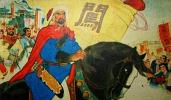The emperors in the late years of the Ming Dynasty were fatuous and incompetent, and power gradually slipped into the hands of eunuchs. Bureaucrats and landlords forcibly occupied large tracts of the fertile lands, leaving many peasants landless. Taxes and natural disasters, which officials did little to relieve, added to the burdens on the peasants.
| 
|
In 1627 AD, a large-scale uprising broke out in the area of what is now northern Shaanxi Province. The unrest spread throughout the country. The strongest of the rebel peasant armies was led by Gao Yingxiang. In 1630, Li Zicheng joined the uprising, rising rapidly to become a general under Gao Yingxiang. After Gao’s death, his army divided into two main parts: one was led by Zhang Xianzhong, and the other by Li Zicheng.
Li Zicheng took command of the rebel forces in today’s Henan Province. Li Zicheng won the support of the people in this disaster-stricken area by a policy of land reform and abolition of agricultural taxes, just as slogan of Li Zicheng’s army said “dividing land equally and abolishing the grain taxes payment system”. Li's army grew rapidly to become a million-strong force. Wherever Li Zicheng’s army went, it distributed the property of the landlords among the people. Li Zicheng enforced strict military discipline, punished officials guilty of crimes and corruption, and paid much attention to the people's welfare. The song of “Killing cattle and sheep, preparing tasty wine and opening the city gate to welcome Chuang Wang” was widely spread at that time. In 1644, Li Zicheng established the Dashun Dynasty in Xi’an. In the same year, he marched on to Beijing. The regime controlled a vast area from south of the Great Wall to north of the Huaihe River. As the rebels entered the capital, Emperor Chongzhen, the last Ming emperor, committed suicide by hanging himself on “Meishan Mountain” (“Coal Hill”, today’s Jingshan Mountain), just behind the Forbidden City. This marks the end of Ming Dynasty.
Meanwhile, Dorgon, the prince regent of the Qing Dynasty, which had been set up in 1636 by the united Manchu tribes of northeast China, hurriedly led an army southward. Breaking through the strategic Shanhai Pass, Dorgon drove Li Zicheng from Beijing. In 1645, Li Zicheng was killed in battle at Jiugong Mountain, Hubei Province. |